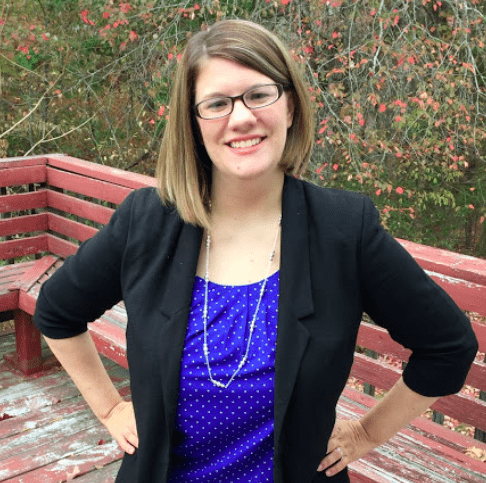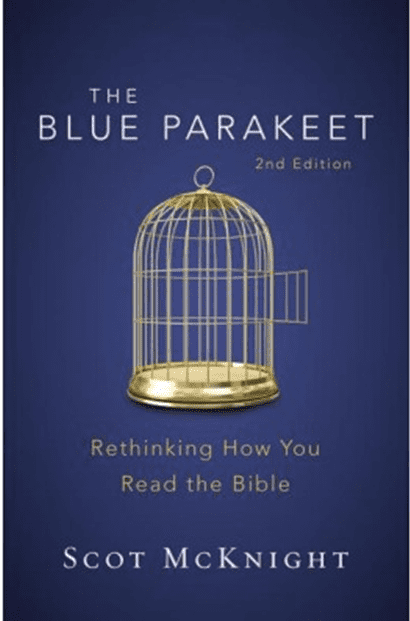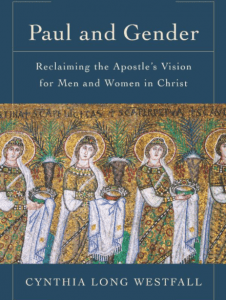Mimi’s post, originally at Missio Alliance, illustrates how the term “complementarian” has a history. It was originally the term used by what is now called egalitarians; thus, they were complementarian without hierarchy. The term as used by complementarians is not so much complementarian but hierarchical in primary connotation with distinction of roles.
What did women do? is a question I ask in Blue Parakeet, and I happily commend the work of Mimi Haddad all the time.
Mimi Haddad is President of Christians for Biblical Equality International.
Do egalitarians overlook the deeper truths of Scripture to promote social-economic equality? Does our commitment to biblical gender equality render us secular wolves dressed as biblical lambs?
In “The Bible Never Says All Men Are Created Equal: How the New Testament Offers a Higher Calling than the Declaration of Independence,” Andrew Wilson wonders why Galatians 3:28 is so often cited as the biblical basis for gender equality when the Greek term for equality, equity, and fairness (isotes) is strangely missing from this passage.
The question of oneness
According to Wilson, Scripture does not teach that Jews are equal to Gentiles; that slaves are equal to masters; or that women are equal to men. For Wilson, the point of Galatians 3:28 is not that Jews and Greeks, slaves and free, and males and females are equal in Christ, but that they are made one in Christ. Wilson argues that oneness is too often confused, thinned, and compromised by an “all men are created equal” rhetoric enshrined in treatises like the US Declaration of Independence.
Wilson does, however, acknowledge the biblical notion of equality (in 2 Cor. 8:13-14 and Col. 4:1) as it elevates right, fair, and dignified treatment regardless of “class, sex, race or subgroup.” Yet, for Wilson, Christians too often substitute Scripture’s deeper path of oneness, partnership, and joint-inheritance for individualist notions of “equal access to entitlements and privileges.”
Wilson claims that this error leads some toward a “sameness” that flattens the rich diversity within the body of Christ (e.g. if the whole body were an eye), particularly between men and women. At his core, Wilson is seeking to trade what he sees as an anachronistic and secular modernist concept of equality for a more biblical approach.
Of course, given the historical and cultural distance between Paul’s world and ours today, it is challenging to accurately interpret Scripture without imposing modern concepts on ancient voices. And for years, critics of egalitarianism have argued that biblical gender equality is not only a foreign concept to the Bible, but it is also one that promotes gender confusion and sameness.
Perhaps it is not that gender equality leads to gender confusion or sameness but that our oneness in Christ gives rise to a sameness of social ethic. Let me explain.
An example of exegesis
Though the word “equality” (isotes) is not used in Galatians 3:28, the passage is seen as the foundation of gender equality—not because physical differences are obliterated but because ontological differences are! That is, any rationale for superiority based on race, class, or gender is eclipsed by our newness of life in Christ—an ethic that stands at odds with all oppression.
To be one in Christ as Jew and Greek, slave and free, and male and female is to become a new creation which experiences a new realm of existence that ultimately conquers not only death, but also sin and prejudice (Romans 6:1- 23). In other words, Galatians 3:28 is the highest expression of individual and therefore corporate renewal. For this reason, the passage was inscribed on ancient baptismal fonts to illustrate the renewing power of Christian rebirth.
Remember, the early Christian baptismal fonts were often shaped like tombs or wombs. The idea being, when you entered the waters of your baptism, you died with Christ to all false gods and to sin’s domination and entered oneness with Christ. It was also the womb that birthed your new life, your new ontology or existence. In rising out of the waters, you became a new creation. That is why Galatians 3:28 was inscribed on ancient baptismal fonts to signify the impact of our new existence. As Paul notes in Galatians 3: 27-29:
As many of you as were baptized into Christ have clothed yourselves with Christ. There is no longer Jew or Greek, there is no longer slave or free, there is no longer male and female; for all of you are one in Christ Jesus. And if you belong to Christ, then you are Abraham’s offspring, heirs according to the promise.
To be clothed in Christ does not alter our physical selves, making us one sex, race, or social class. That would be absurd. Being clothed in Christ makes us one body, harmonious in Jesus despite the hostilities arising because of our physical selves and their social privileges. While our physical selves and their social station persist, even so, we now belong to Christ and inherit not only life eternal, but a higher ethical life.
For this reason, the eminent Bible scholar, F.F. Bruce asserts that Galatians 3:28 promotes not sameness of race, class, or gender but sameness of new life: a new race of people are born of the Spirit and are therefore no longer divided by social or economic hostilities.
Therefore, what Christ accomplished on Calvary (soteriology) in creating a new race, shapes and is inseparable from how the church functions (ecclesiology), namely placing God’s work ahead of race, economic, or gender barriers or hostilities.
Putting it all together
While Wilson fears that egalitarians read Galatians 3:28 anachronistically, that was—I believe—Paul’s point! Newness of life is lived differently, and therefore parts company with ancient prejudices. Christ placed New Covenant people and their practices at odds with their own culture (both Jew and Greek) precisely because oneness in Christ meant that the eyes, ears, hands, and feet of the church are no longer Jewish, free, and male, nor are they androgynous.
Rather, the eyes, ears, hands and feet of the church are both Jewish and Greek, they are both free and enslaved, and they are both male and female. This is why the disciples found Christ’s welcome of women and Greeks so unsettling. And, those living under Roman law also maintained a hierarchy of free over slave, and male over female, and as such they were equally disturbed by the church’s egalitarian practices. But Paul persisted.
In writing to the church in Galatia, Paul is astonished that they so quickly succumb to a perverse gospel: one that pleases people but in doing so, offends God (Gal. 1: 1-10). But, as Paul tells us, the gospel he received was not of human origins but revealed through Christ (Galatians 1:12).
The gospel promoted not circumcision of the flesh but of the heart (Romans 2:29). It did not divide people by food taboos, but united them through agape meals where all were welcome at the table. Though born of the spirit, the church at Galatia experienced divisions based on race, class, and gender which stymied their life, service, and witness as the church.
Therefore, the oneness Paul evokes in Galatia is not access to spiritual renewal (soteriology) because they were already believers. What Paul is calling for is the functional and ethical renewal (ecclesiology) of newness in Christ. They were born again, but now they needed to grow up! For the sake of the church and its mission, the privileges of the Jew are now those of the Greek, the privileges of the free are now those of the slave, and the privileges of males are now those of females.
Philemon and Onesimus
Consider the life of Onesimus, Philemon’s slave. Paul calls masters to give their slaves “what is right and fair” (2 Corinthians 8:13-14) just as he tells Philemon to receive Onesimus as a brother, a term that points to their oneness and new life in Christ (Philemon 1:16). Onesimus and Philemon share a spiritual rebirth—a spiritual or ontological sameness with ethical and functional consequences. What is the result of their new life in Christ?
Philemon releases Onesimus, who becomes useful not only to Paul but to the entire church. Onesimus becomes bishop of Ephesus. In releasing Onesimus, the ethical realities of unity, oneness, fairness, love and justice triumph over prejudice and domination.
Consider also the depth of oneness on display in Ephesians chapter 5, not only between believers who mutually submit to one another (5: 21), but also between husband and wife in marriage. Notice that Paul appeals to those with the most cultural privilege to be the first to love as Christ did, sacrificially. Husbands must be the first to demonstrate the new reality (or ontology) of oneness in Christ, not because of their gender, but because of the cultural privilege that came with gender. Paul is asking them to live out a deeper and eternal reality (and social ethic). The gift of Christ is not like the curse, as Paul states in Romans 5:15.
Our sameness of spiritual rebirth imparts a new social ethic, including service without prejudicial barriers. Our material or bodily differences remain part of the rich diversity God intended for humanity, and are the foundation of a strong and vital church. Unfortunately, they have too often resulted in division, marginalization, and oppression—as noted in the church at Galatia.
Yet, Paul evokes our union in Christ and our unity as Christians as the basis of our ultimate identity and destiny—shaped not by our physical birth but by a shared spiritual rebirth.
Our new being and ontology is not a material state but an invisible, eternal reality. Thus, when egalitarians (or biblical mutualists) argue that it is not race, gender, or class that equips an individual for service but character. They appeal to a new social ethic mandated by oneness in Christ. The sameness egalitarians celebrate is not androgyny but a sameness of spiritual rebirth.
We are committed to service without prejudice because we are a new creation and therefore, one in Christ. Indeed, equality is a thin word compared to the oneness that results from our rebirth in Christ. And yet, equality of service is precisely what our oneness inspires—a dismantling of human barriers and hostilities that will change the world.
.



















